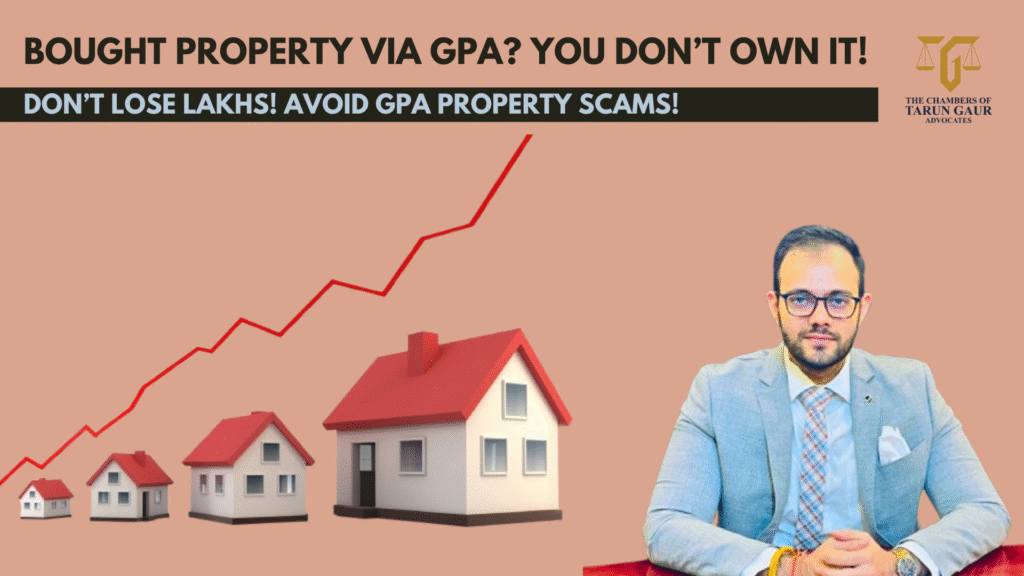🏠 Introduction
Real estate is often the most significant investment a person makes in their lifetime. But despite its importance, many homebuyers in India—especially in Delhi—unintentionally fall victim to property fraud by relying on invalid documents like General Power of Attorney (GPA) or Agreements to Sell instead of properly registered sale deeds.
These shortcuts may seem convenient or even cost-effective, but they come with enormous legal risks. In fact, the Supreme Court of India, in the landmark case of Suraj Lamps & Industries v. State of Haryana [(2011) 11 SCR 848], made it clear: property ownership cannot be transferred through GPA, Agreement to Sell, or Will.
As a practicing advocate in the Delhi High Court, I’ve seen first-hand how these fraudulent practices lead to financial ruin, emotional stress, and years of litigation. This blog is your guide to staying informed and secure while investing in property.
⚖️ Understanding the Legal Context: What the Supreme Court Said
The Suraj Lamps judgment delivered a decisive blow to the use of non-transferable documents in property transactions. Here’s what the Court held:
-
GPA, SA (Sale Agreement), and Wills do not convey ownership.
-
Only a registered sale deed or conveyance deed is legally valid for transferring immovable property.
-
The use of non-transferable documents is often a method to avoid stamp duty, registration charges, and capital gains tax, contributing to black money and title fraud.
-
Such transactions lack legal sanctity, are not recognized under the Transfer of Property Act, Indian Stamp Act, or Registration Act.
Despite this clarity, unscrupulous brokers and sellers continue to misuse these documents—especially in Delhi’s unregulated real estate markets.
⚠️ Issues Faced by Buyers in Invalid Transactions
-
No Legal Ownership: GPA/SA/WILL do not give you ownership rights.
-
Title Uncertainty: You can’t prove ownership without a registered title.
-
Fraud Risks: Sellers can easily re-sell the same property.
-
Weak Legal Protection: Limited remedies if disputes arise.
-
Financing Problems: Banks rarely approve loans on such properties.
-
Hard to Resell: Future buyers avoid such uncertain titles.
👿 How Fraudsters Exploit Buyers
Despite legal awareness campaigns, fraudsters continue to target uninformed buyers:
-
Multiple Sales of the Same Property: Fraudsters execute multiple GPA/SA agreements.
-
Avoiding Registration Costs: Luring buyers by skipping stamp duty and registration.
-
Legal Ambiguity: When fraud is discovered, buyers struggle to prove ownership in court.
🛡️ Solutions: How to Protect Your Investment
As a property buyer in Delhi, here’s what you must do:
✅ Insist on a Registered Sale Deed
This is the only legal method to transfer ownership.
✅ Verify Title Thoroughly
Do a title search and get legal opinion before signing.
✅ Engage a Property Lawyer
Never rely on brokers alone—legal due diligence is key.
✅ Avoid Cash Payments
Use bank transfers to maintain clear financial trails.
✅ Check Encumbrance Certificates
Ensure no loans or litigation is pending on the property.
✅ Regularize Earlier Transactions
If you already bought via GPA/SA, file for a registered sale deed or sue for specific performance.
✅ Possession Defence Under Section 53A TPA
This can help defend possession if the seller tries to evict you.
✅ Initiate Legal Action for Fraud
You can sue the seller for misrepresentation or fraud.
📝 Real-Life Tip from Advocate Tarun Gaur
As an advocate practicing in Delhi High Court, I advise all clients—especially first-time buyers—to never rely on just one broker or hearsay legal advice. The cost of hiring a qualified lawyer is negligible compared to the risk of losing lakhs in a fraudulent deal.
🧠 Conclusion: Stay Smart, Stay Safe
Buying property in Delhi or anywhere in India? Make sure your transaction is legally compliant and backed by a registered deed. Do not fall for GPA or Agreement to Sell tactics—they’re legally invalid and highly risky.
When in doubt, consult a legal expert. A little due diligence today can save you from years of regret tomorrow.
📩 Need Legal Guidance?
If you’ve already entered into such a transaction or are unsure about your property documents, reach out for a consultation.
📞 Advocate Tarun Gaur
Practicing in Delhi High Court | Property Law | Civil Litigation

